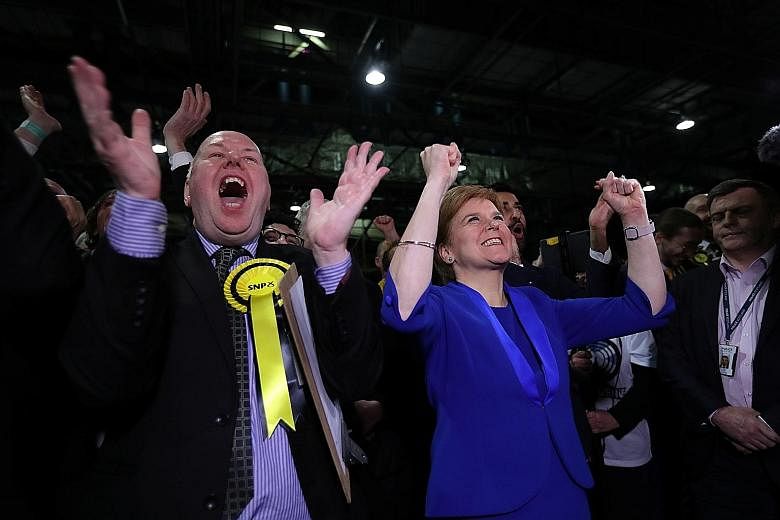LONDON • The election result in Britain was hailed as a victory for English, Scottish and Irish nationalism, but it could also spell the end of the United Kingdom.
While Mr Boris Johnson's Conservative Party swept the opposition aside across much of England on his promise to get Brexit done, Scottish nationalists captured 48 of the 59 parliamentary seats in Scotland.
In Northern Ireland, supporters of a united Ireland won more seats than those in the province who want to remain part of the United Kingdom, for the first time since the 1921 partition that divided the British north from the Irish Republic in the south.
Throughout the election campaign, Mr Johnson said he was committed to the union and denied accusations that his Brexit deal would create an economic barrier between the British mainland and Northern Ireland.
"At this stage, it does look as though this one-nation Conservative government has been given a powerful new mandate to get Brexit done, and not just to get Brexit done but to unite this country and take it forward," the Prime Minister said yesterday after winning his own seat in west London.
But opponents said it was his appeal to English nationalism with his promise to "Get Brexit done" at the expense of the interests of Scotland and Northern Ireland that had been instrumental in his success.
Triumphant Scottish and Irish nationalist leaders and defeated opponents saw Mr Johnson's victory as opening the way to the disintegration of the United Kingdom.
Scottish National Party (SNP) leader Nicola Sturgeon said the result was a clear mandate for a second plebiscite on Scottish independence. Scotland, England's political partner for 300 years, voted against secession from the United Kingdom by 55 per cent to 45 per cent in 2014. But Scots backed staying in the European Union in the 2016 referendum, and Ms Sturgeon has argued that Brexit meant they should have another say on independence.
"Boris Johnson may have a mandate to take England out of the European Union. He emphatically does not have a mandate to take Scotland out of the European Union. Scotland must have a choice over our own future," she said.
A majority in Northern Ireland also voted against leaving the European Union, and anti-Brexit parties took more seats in the province for the first time. Nationalists said the result paved the way towards a vote on whether there should be a united Ireland.
"We are heading towards a border poll, I can't give you a definitive date, but we need to do the spade work now and prepare ourselves," Sinn Fein leader Mary Lou McDonald said.
"We need to, in an orderly fashion, structure the conversation about a new Ireland and constitutional change. I don't think unionism should be alarmed or frightened, this is a huge opportunity for everybody who lives on this island."
The Democratic Unionist Party, which propped up the minority Conservative government in London after the last election in 2017, said it had ultimately been betrayed by Mr Johnson's Brexit deal with Brussels that it said would create an economic border between Britain and Northern Ireland.
"The great irony of all of this is that for decades, unionists have looked over their shoulders and decided that Irish nationalists were the great threat... but actually it is English nationalism," Mr Mike Nesbitt, former leader of the Ulster Unionist Party, told the BBC.
REUTERS











